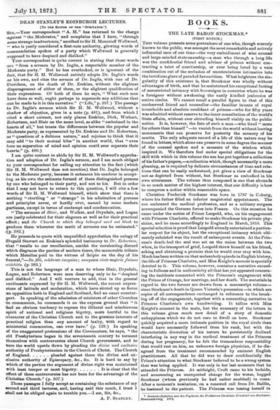DEAN STANLEY'S EDINBURGH LECTURES.
[To TES EDITOZ OF THE " SPEOTATOR.1
zit,—Your correspondent "A. M." has rethrned to the charge against "the Moderates," and complains that I have, "through some strange inadvertence," ascribed to Sir H. Moncrieff Wellwood, -" who is justly considered a first-rate authority, glowing words of -commendation spoken of a party which Wellwood is generally supposed to have despised and disliked."
Your correspondent is quite correct in stating that those words are "from a sermon by Dr. Inglis, a respectable member of the Moderate party." But he has overlooked, or is ignorant of the 4act, that Sir H. M. Wellwood entirely adopts Dr. Inglis's words as his own, and cites the sermon of Dr. Inglis, with one of Dr. IDavidson, on the death of Dr. Erskine, without the slightest disparagement of either of them, or the slightest qualification of their expressions. Of both of them he says, " What such men have done so well, ought perhaps to supersede any additions that -can be made to it in this narrative." ("Life," p. 397.) The passage in Dr. Inglis's sermon which Sir H. M. Wellwood, without a shadow of objection, gives in a note (p. 481), and from which I -cited a short extract, not only places Erskine, Dick, Wishart, Robertson, and Blair on the same level, as alike "embalmed in the hearts of all," but treats the differences between the popular and Moderate party, as represented by Dr. Erskine and Dr. Robertson,
as"questions of a dubious nature," and rejoices to think that it .may add "to their mutual bliss" in another world, that "even 'here no separation of mind and opinion could ever separate their tearts." (p. 480.)
I am quite content to abide by Sir H. M. Wellwood's approba- tion and adoption of Dr. Inglis's sermon, and I am much obliged to your correspondent for calling my attention to the fact (which Sir H. M. Wellwood does not mention) that Dr. Inglis belonged to the Moderate party, because it enhances his candour in accept- slog as his own the estimate formed of these distinguished persons by one who belonged to their party, and not to his. But in order that I may not have to return to this question, I will cite a few words of Sir H. M. Wellwood himself, which show that there is 'nothing " startling " or "strange" in his admiration of persons and principles never, or hardly ever, named by some modern ,partisans, except in terms of contempt and condemnation.
"The sermons of Blair, and Walker, and Drysdale, and Logan Are justly celebrated for their elegance as well as for their practical effect ; and the Church to which they belonged need not blush to produce them wherever the merit of sermons can be estimated." (p. 382.)
He proceeds to quote with unqualified approbation the eulogy of
inagald Stewart on Erskine's splendid testimony to Dr. Robertson, that "recalls to our recollection, amidst the unrelenting discord which disgraces the parties of modern times, the memorable tribute 'which Metellus paid to the virtues of Scipio on the day of his funeral,"—Ite fill., celebrate exequias ; nun quam civis majoris fuinius videbitis. (p. 383.)
This is not the language of a man to whom Blair, Drysdale,
Logan, and Robertson were men deserving only to be "despised And disliked." And I will venture to add, that in the general sentiments expressed by Sir H. M. Wellwood, the recent expres- sions of latitude and moderation, which have stirred up so fierce an opposition both in England and Scotland, find an exact counter- part. In speaking of the admission of ministers of other Churches to communion, he commends it on the express ground that "it 'bad an obvious tendency to repress the illiberal and mischievous spirit of national and religious bigotry, more hurtful to the .eharacter of the Christian Church and to the genuine interests of practical religion than any amount of laxity, with regard to ministerial communion, can ever have." (p. 139.) In speaking ctr the exaggerated pretensions of the Covenanters, he says, "the old Presbyterians began in the seventeenth century to torment themselves with controversies about Church government, and to turn the world upside down by pleading the divine and exclusive authority of Presbyterianism in the Church of Christ. The Church of England pleaded against them the divine and ex- elusive authority of Episcopacy, &c., &c. It is hard to say by which of the parties the argument of divine right was maintained
with least temper or most bigotry It is clear that the effect of these controversies has not been for the advantage of the Christian Church." (p. 507.) These passages I fully accept as containing the substance of my second and third lectures, and, having said this much, I trust I shall net be obliged again to trouble you.—I am, Sir, &e., A. P. STANLEY.


































 Previous page
Previous page